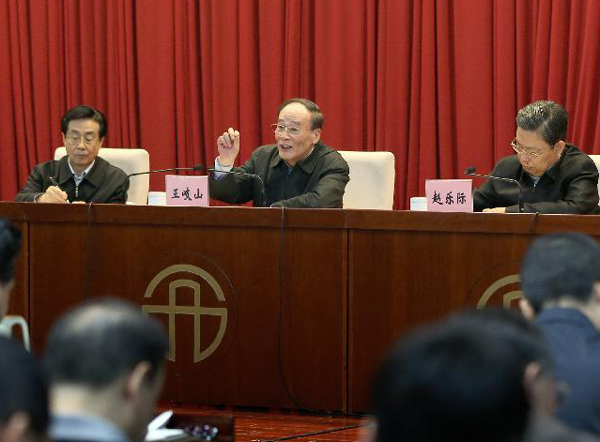 |
|
Wang Qishan (center), a member of the Standing Committee of the Political Bureau of the Communist Party of China (CPC) Central Committee and secretary of the CPC Central Commission for Discipline Inspection, addresses a conference on the work of central-level Party inspection in Beijing, China, Feb 11, 2015. [Photo/Xinhua] |
A military court sentenced former senior military official Gu Junshan to death with a two-year reprieve, Xinhua reported on Monday. Quite a few military "tigers" (high-ranking corrupt officials) such as former vice-chairmen of the Central Military Commission Xu Caihou and Guo Boxiong have fallen in the anti-corruption campaign. Ironically, this has prompted some officials to say the campaign should now be loosened. Needless to say, their argument is baseless.
When the ongoing crackdown on corruption was launched, many, if not most, of the officials assumed - thanks to the outcomes of some previous drives - that it would not last more than one year and the guilty would get lighter punishments to save higher authorities' face.
The fact is, some earlier anti-corruption drives faded because they had some inherent defects. For example, retired officials and some serving in key State-owned enterprises, the People's Liberation Army and other "sensitive" organizations were hardly the targets in the realm of investigations. This made some officials somewhat immune to crackdowns against corruption.
Another flaw in the past campaigns was the insufficient supervision over power. Some Party chiefs of counties or county-level cities, who were immune to earlier anti-corruption drives, are a good example of such a flaw, as they have long been accused of wielding too much power. In some corruption cases that have been exposed, Party chiefs of counties had become de facto rulers because most of the supervision mechanisms designed to keep their powers in check proved ineffective. Sometimes such officials even formed interest groups, in which hidden rules replaced the country's law and Party discipline to promote corrupt officials.
These flaws are being corrected in the ongoing campaign, which, according to the statements of top leader Xi Jinping and disciplinary chief Wang Qishan, is aimed at establishing an institutionalized anti-corruption mechanism.
The top leadership is determined to continue the anti-corruption campaign, in which the country's law and Party discipline will continue to play the key role. The fall of "tigers" and "flies" (lower-level corrupt flies) shows that no official found corrupt can escape punishment.
There is no longer any place for corrupt officials to hide. Inspection teams, under direction from the central disciplinary authorities, scrutinize not only different levels of governments, but also State-owned enterprises, the PLA and even State-run colleges. And, one after another, they have hunted down a large number of corrupt officials. In particular, it should be emphasized that some retired officials, too, have been investigated for (their past) corruption and punished.
Disciplinary committees at various levels have always done a good job, but they are working harder now. Whenever and wherever the inspection teams go, they make public their phone numbers and addresses to make it easier for whistleblowers to provide clues. Besides, the country's law and Party discipline provide systematic regulations to routinely fight corruption.
Many analysts say the ongoing campaign features "high pressure", but they should attach more importance to the institutionalized anti-corruption mechanism to eliminate corruption and promote the rule of law.
The author is a professor at Zhou Enlai School of Governance of Nankai University.

I’ve lived in China for quite a considerable time including my graduate school years, travelled and worked in a few cities and still choose my destination taking into consideration the density of smog or PM2.5 particulate matter in the region.